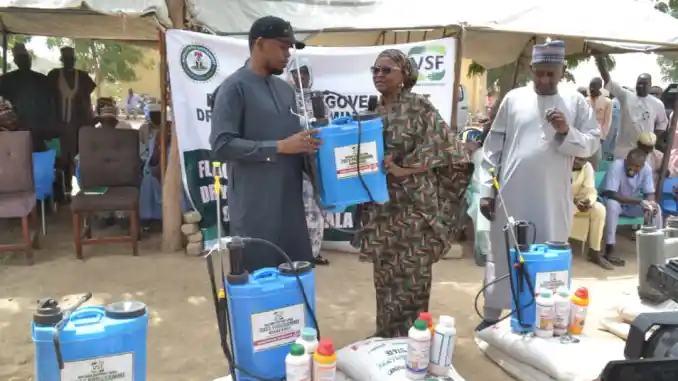The Victims Support Fund (VSF) has empowered farmers with farming inputs to ensure that the victims of insurgency are empowered to get back to their farmlands and boost agricultural activities in Borno State and Nigeria as a whole.
The Executive Director of VSF, Prof. Nana Tanko, disclosed during the distribution exercise that the program has been structured to empower 3,000 farmers in two local governments, adding that agricultural extension workers have been trained by VSF on how to boost food production during dry season farming.
She explained that 3,000 beneficiaries were strategically selected from peasant farmers in their various communities based on their agricultural productivity, noting that 1800 farmers were selected from Ngamboru-Nagala LGA, while 1,200 were selected from Gwoza LGA.
FMAFS Partners NPRGS to Empower FCT Farmers with Training and Inputs
According to her, each beneficiary got 25kg of rice seed, 50kg of fertilizer, two liters of insecticides, 1 liter of herbicide, and one Knapsack sprayer, among others.
“The victims support fund led by Gen. TY Danjuma is committed to bringing succor to the victims of insurgency. Now we have distributed dry farming inputs in Ngala, where 1800 beneficiaries received their farm inputs.
“Victims Support Fund has been working in the Northeast since 2014, providing succor to victims of insurgency in areas of peacebuilding, livelihood and recovery, construction, and education. The intervention is part of the VSF 2023 project to support the Borno state agricultural initiative.”
Jigawa Receives AfDB Delegate, Set to Increase Whet Production
The Borno Governor, Babagana Umara Zulum, represented by the state Commissioner of Agriculture, Bawu Musami, who flagged off the distribution exercise, said the items given to the farmers would enhance food production in the state.
He reiterated that the VSF had always been there for the state in times of need, adding that the inputs would help the farmers not only for food production but in strengthening the economy of the state because farming is the backbone of Borno as an agrarian state.



